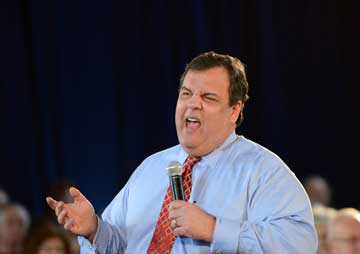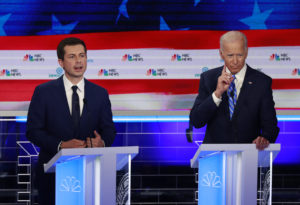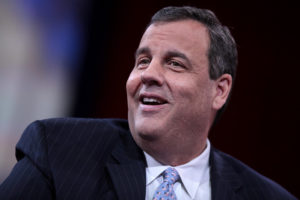Is Corruption a Constitutional Right?
Last week, the GOP filed a federal lawsuit aimed at overturning the pay-to-play law that bars governors from raising campaign money from Wall Street executives who manage their states' pension funds. New Jersey Gov. Chris Christie. L.E.MORMILE / Shutterstock.com
New Jersey Gov. Chris Christie. L.E.MORMILE / Shutterstock.com
Wall Street is one of the biggest sources of funding for presidential campaigns, and many of the Republican Party’s potential 2016 contenders are governors, from Chris Christie of New Jersey and Rick Perry of Texas to Bobby Jindal of Louisiana and Scott Walker of Wisconsin. And so, last week, the GOP filed a federal lawsuit aimed at overturning the pay-to-play law that bars those governors from raising campaign money from Wall Street executives who manage their states’ pension funds.
In the case, New York and Tennessee’s Republican parties are represented by two former Bush administration officials, one of whose firms just won the Supreme Court case invalidating campaign contribution limits on large donors. In their complaint, the parties argue that people managing state pension money have a First Amendment right to make large donations to state officials who award those lucrative money management contracts.
With the $3 trillion public pension system controlled by elected officials now generating billions of dollars worth of annual management fees for Wall Street, Securities and Exchange Commission regulators originally passed the rule to make sure retirees’ money wasn’t being handed out based on politicians’ desire to pay back their campaign donors.
“Elected officials who allow political contributions to play a role in the management of these assets and who use these assets to reward contributors violate the public trust,” says the preamble of the rule, which restricts not only campaign donations directly to state officials, but also contributions to political parties.
In the complaint aiming to overturn that rule, the GOP plaintiffs argue that the SEC does not have the campaign finance expertise to properly enforce the rule. The complaint further argues that the rule itself creates an “impermissible choice” between “exercising a First Amendment right and retaining the ability to engage in professional activities.” The existing rule could limit governors’ ability to raise money from Wall Street in any presidential race.
In an interview with Bloomberg Businessweek, a spokesman for one of the Republican plaintiffs suggested that in order to compete for campaign resources, his party’s elected officials need to be able to raise money from the Wall Street managers who receive contracts from those officials.
“We see (the current SEC rule) as something that has been a great detriment to our ability to help out candidates,” said Jason Weingarten of the Republican Party of New York — the state whose pay-to-play pension scandal in 2010 originally prompted the SEC rule.
The suit comes only a few weeks after the SEC issued its first fines under the rule — against a firm whose executives made campaign donations to Pennsylvania Gov. Tom Corbett, a Republican, and Philadelphia Mayor Michael Nutter, a Democrat. The company in question was managing Pennsylvania and Philadelphia pension money. In a statement on that case, the SEC promised more enforcement of the pay-to-play rule in the future.
“We will use all available enforcement tools to ensure that public pension funds are protected from any potential corrupting influences,” said Andrew Ceresney, director of the SEC Enforcement Division. “As we have done with broker-dealers, we will hold investment advisers strictly liable for pay-to-play violations.”
The GOP lawsuit aims to stop that promise from becoming a reality. In predicating that suit on a First Amendment argument, those Republicans are forwarding a disturbing legal theory: Essentially, they are arguing that Wall Street has a constitutional right to influence politicians and the investment decisions those politicians make on behalf of pensioners.
If that theory is upheld by the courts, it will no doubt help Republican presidential candidates raise lots of financial-industry cash — but it could also mean that public pension contracts will now be for sale to the highest bidder.
David Sirota is a senior writer for the International Business Times and the best-selling author of the books “Hostile Takeover,” “The Uprising” and “Back to Our Future.” Email him at [email protected], follow him on Twitter @davidsirota or visit his website at www.davidsirota.com.
© 2014 CREATORS.COM
Your support matters…Independent journalism is under threat and overshadowed by heavily funded mainstream media.
You can help level the playing field. Become a member.
Your tax-deductible contribution keeps us digging beneath the headlines to give you thought-provoking, investigative reporting and analysis that unearths what's really happening- without compromise.
Give today to support our courageous, independent journalists.





You need to be a supporter to comment.
There are currently no responses to this article.
Be the first to respond.